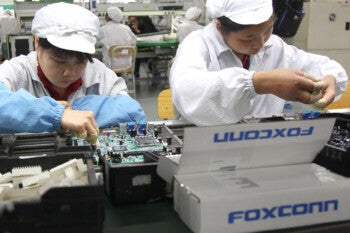Apple's top contract manufacturer forced to shut for at least one week as COVID returns in China

A renewed wave of COVID cases in China has forced contract manufacturer Foxconn to temporarily close its factory in Shenzhen. This could result in some delays when it comes to the shipments of certain Apple devices since Foxconn is responsible for the production of many of the tech giant's products including certain iPhone models. The company says that it will now depend on backup plans to prevent any disruptions.
Foxconn has temporarily closed its manufacturing facilities in Shenzhen for a week
According to Reuters, the 17.5 million people living in Shenzhen have been placed on lockdown for one week and with bus and subway systems closed, only essential businesses in the city are allowed to remain open. While many of our readers might consider the production of Apple devices to be essential, the government in China does not agree and Foxconn's huge factory is closed temporarily.

Foxconn's facilities in Shenzhen are shut for at least one week
Apple isn't the only tech firm to be impacted by the lockdown in Shenzhen. The latter happens to be where Huawei's headquarters are located, and analysts at securities firms are getting concerned. Nomura Securities' chief China economist Ting Lu told clients, "The COVID situation in China has deteriorated at an alarming pace over the past week, but abandoning zero-COVID now could be perceived as conceding that the strategy did not work in the first place."
We could see shortages impact the supply chain once again
The zero-COVID strategy has led to lockdowns, mask mandates, and severe restrictions in the country. But COVID practically disappeared in China starting in 2020 even while it spread like Wildfire around most of the world. But now it appears to be returning in the country. When the coronavirus first became known in late 2019, Foxconn had already shut down the assembly lines in locations such as Shenzhen and by February of the next year, the plants were still shuttered.
In March of 2020, finding a carrier in New York City carrying a wide selection of the latest iPhone models in stock was nearly impossible. An AT&T rep working out of a store in New York City explained at the time that when the last shipment of handsets allocated to his retail location arrived, it contained "just flip phones and Samsungs."
If COVID cases continue to rise in China, we could see the supply chain affected once again leading to a shortage of the chips and components needed to build certain mobile devices. Reuters reports that the number of symptomatic COVID cases in China tallied so far this year already tops the number seen throughout 2021.
Follow us on Google News













Things that are NOT allowed:
To help keep our community safe and free from spam, we apply temporary limits to newly created accounts: